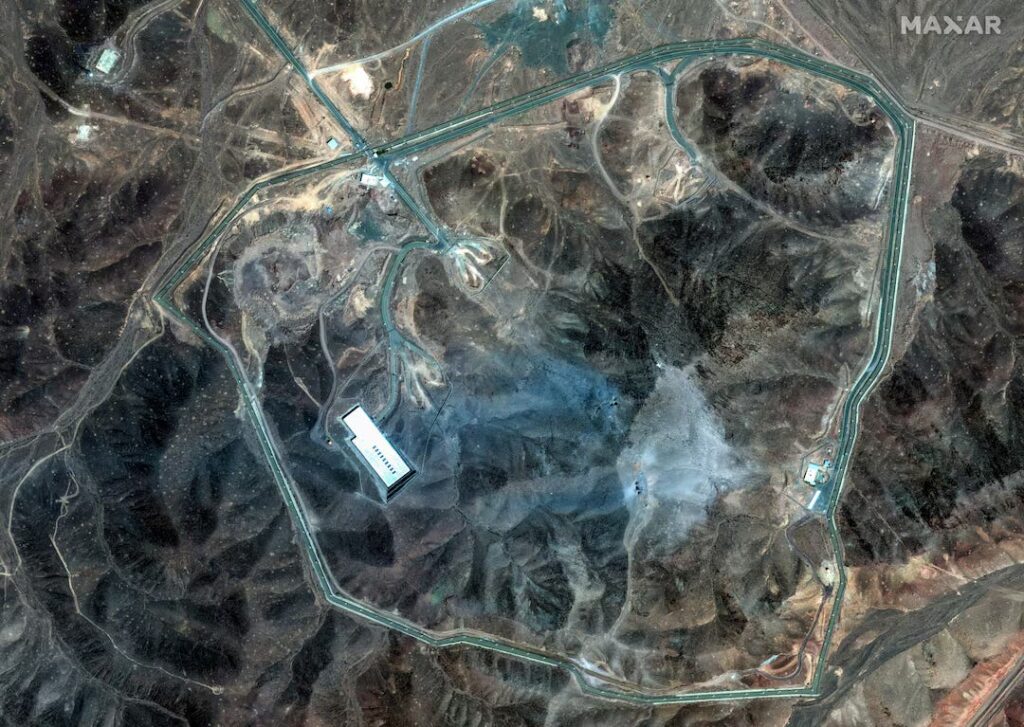Volcanoes are erupting in The Philippines, but on-fire Australia received some welcome rain. The Iran war cries have been called off and The Donald’s military powers are about to be hamstrung by the Senate. Meanwhile, his impeachment trial is starting, and we’re all on Twitter for a front-row seat.
What Could Go Right? We Were Never Close to WWIII
Fearmongering on social media during the "12-day War" conflated real risks with baseless concerns.
This is our weekly newsletter, What Could Go Right? Sign up here to receive it in your inbox every Thursday at 5am ET. You can read past issues here.
We Were Never Close to WWIII
As of Thursday morning, the ceasefire between Iran and Israel is still holding. The “12-Day War” may indeed turn out to have lasted only that long.
But in the days between Saturday, when President Donald Trump announced that the United States had struck three nuclear sites in Iran, and Tuesday, when the ceasefire was declared (and then denied, and then accepted), WWIII was in the air.
During that period, American friends told me about conversations they had about go-bags—are they packed?—and survival stashes in the basement. My partner’s Dutch coworker was worried on Monday that he was going to be drafted. We’re on the “brink of WWIII” memes and videos were ubiquitous across social media, even if many of them were (tasteless) jokes.

Other than a sure shakeup of the status quo, what will happen in the long term inside Iran, between Iran and Israel, and among major players in the area—as well as international interventionists like the US—is unclear. Early intelligence reports have assessed that Iran’s nuclear program has been set back by only months and that they may distance themselves from nuclear watchdogs.
However, there were pre-ceasefire signs that Iran did not want to risk escalation with the US in the short term. Their promised retaliation, strikes on a US airbase in Qatar, amounted to what member of The Progress Network (TPN) Thomas Friedman called a “harmless sound and light show.” Both the Trump administration and the Qatari government were warned, and the base evacuated prior to the attack. Qatar intercepted most of the missiles, and no one was hurt.
What was highly unlikely from the start was WWIII, not to mention a draft—the US hasn’t had one since the Vietnam War. Even a deployment, and especially another protracted conflict in the Middle East, is something that both President Trump and a large chunk of his base would like to avoid. After the Iranian’s response, Trump thanked them publicly for the advance notice and then “sprinted for the exit ramp,” wrote TPN member Ian Bremmer.

As early as Sunday, it was noticeable that Iran’s biggest allies were not interested in intervening on its behalf. Russia is busy with its own war in Ukraine. No longer reliant on Iranian weaponry to maintain it, Russia’s officials offered Iran intelligence cooperation, but no material support. They are also concerned about protecting a Russian diaspora in Israel of about two million people.
China was even less forthcoming, offering neither material nor political support. Its main concern was economic; namely, the crude oil that it imports daily through the Strait of Hormuz. Iran may have never acted on its threat to close the waterway precisely due to its allies’ dependence on it, not to mention its own.
(For more on Iran’s relationship with Russia and China, I recommend Elise Labott on Substack and Nicole Grajewski in The New Yorker.)
Whether WWIII was in the cards or not depended on who you turned to during the fracas. Fearmongering spread like wildfire on social media through irresponsible influencers like Tucker Carlson and Candace Owens. Liberals, too, saw viral videos like this one in which the poster insinuates that US soldiers were about to be deployed. The mainstream media was far less hyperbolic; the problem, however, is that social media is now Americans’ primary source of news, and its nightmares guide their thinking.
The world is more conflict-ridden and unstable than it has been in years. I worry about our ability to meet what challenges will arise from such circumstances if we cannot see those circumstances clearly. Conflating valid concerns of a regional conflict, perhaps one in which the US would remain involved, with baseless ones of a multi-continent war neither serves us nor honors the people whose lives have already been upended by the fighting.
I have been turning to the following TPN members for a cool-headed response to scary and complex news on this front:
- Sharon McMahon, who has been answering questions from her sizable social media audience since the weekend. She also has a newsletter, The Preamble.
- GZERO Media, led by Ian Bremmer, for international news and analysis
- Middle East Uncovered, founded by Faisal Saeed Al Mutar, for takes by people who really know the area
What Could Go Right? S7 E16: Are High-Achieving Families Born or Made? with Susan Dominus

Can sibling rivalries shape success? Zachary and Emma speak with Susan Dominus, Pulitzer Prize-winning journalist and staff writer at The New York Times Magazine. She is the author of The Family Dynamic: A Journey Into the Mystery of Sibling Success. Susan shares case studies about high-achieving families and how siblings can be powerful motivators. She also touches on the role of parents, the balance between encouragement and counterproductive pressure, and the importance of defining success beyond material wealth. | Listen now
By the Numbers
29: The number of countries that have enacted femicide laws since 1996
18M: The number of people who gained access to basic sanitation in 2024
42%: The year-on-year drop in homicides in Jamaica so far in 2025
Quick Hits
💉 “The US has approved the world’s only twice-a-year shot to prevent HIV,” reports The Associated Press, a gamechanger for those used to taking daily PrEP pills to prevent infection. European-country approvals should follow later this year. The shot’s manufacturer, Gilead, has inked deals to allow generics to be produced on the cheap in 120 low-income countries, but it is as of yet unclear whether the shot will reach where in the world it is needed most.
🏭 Ireland has joined a small but growing group European countries that have completely ended coal power generation. Several others, including Greece and Italy, are set to do so in the coming years.
🧃 A handful of US food brands, including Kraft Heinz, General Mills, Pillsbury, and Nature Valley, have announced that they will remove all synthetic food coloring from their products by the end of 2027, following scrutiny from the Department of Health and Human Services as well as bans fomenting in nearly half of US states.
🐘 Animal captivity standards in the United Kingdom are receiving an overdue refresh: zoos and aquariums will have two years to enact new reforms, from ensuring larger habitats for elephants to ending visitor experiences that disturb the animals, such as the petting of fish, rays, and octopuses.
🔬 CAR-T therapy, in which patients’ cells are reengineered to the fight cancer-causing ones, has been successful in treating certain types of cancers. Now, a “growing body of evidence,” reportsThe New York Times, points to it as a valid treatment for the autoimmune disease lupus as well.
☀️ Solar-powered canoes are now ferrying children to school, bringing patients to health centers, and more in the network of isolated villages where Indigenous communities live in the Ecuadorian Amazon.
🐦 After a quarter century of eradicating invasive species along a string of Pacific islands near Baja California in Mexico, conservationists have seen the return of 22 out of the 27 seabird populations that had slowly disappeared since sealers and whalers arrived in the 1800s.
⚡ China is planning to nearly double its nuclear power capacity by 2040; meanwhile, Governor Kathy Hochul announced plans to build the first major new US nuclear power plant in 15 years in upstate New York. The commercial shipping industry is also eyeing the possibility of nuclear power for its cargo ships.
✈️ In response to several high-profile aviation incidents and near-misses, Southwest and other American airlines are installing cockpit alert systems that warn pilots of safety risks—if they are descending too quickly or too sharply, for example, or are on a taxiway instead of a runway.
👀 What we’re watching: Bolivia’s Senate has passed a bill that would ban child marriage. It now goes to the lower house, where its fate is uncertain. Elsewhere in the neighborhood, Colombia has declared child marriage unconstitutional, after abolishing a law that allowed marriage from the age of 14 in 2024.
💡 Editor’s pick: Is there such a thing as left-wing climate misinformation?
TPN Member Originals
(Who are our Members? Get to know them.)
- Is striking Iran unconstitutional? | The Preamble | Sharon McMahon
- Iran’s future in five scenarios | Middle East Uncovered | Faisal Saeed Al Mutar
- 21 thoughts on Trump’s war with Iran | Slow Boring | Matthew Yglesias
- Israel is succeeding, but will it overreach? | WaPo ($) | Fareed Zakaria
- Is Trump backing off his mass deportation plan? | Tangle | Isaac Saul
- It is safe to let Haitians (and everyone else) travel | CGD | Charles Kenny
- We don’t have to give in to the smartphones | NYT ($) | Jonathan Haidt
- The strength you gain by not taking offense | The Atlantic ($) | Arthur C. Brooks
- The problem-solving animal, part 2 | The Roots of Progress | Jason Crawford
- Noem’s threat to remove elected officials in California mimics authoritarians abroad | Lucid | Ruth Ben-Ghiat
- The AI economy is here | Faster, Please! | James Pethokoukis
- Comrade Trump | Diane Francis | Diane Francis
- Pomp vs. protest | No Mercy/No Malice | Scott Galloway
- Speechwriting, then and now | Breaking the News | James Fallows
- Non-member add: The economic consequences of a war with Iran | Noahpinion | Noah Smith


